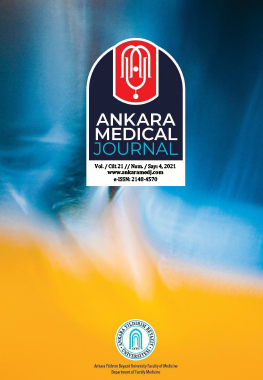Awareness of Normal Weight, Overweight and Obese Patients About Complications, Risk Factors and Prevention of Obesity
Ahmet Dirikoç1, Birgül Genç2, Didem Ozdemir1, Şefika Burçak Polat1, berna evranos ogmen1, Oya Topaloğlu1, Reyhan Ersoy1, Bekir Cakir11Ankara Yildirim Beyazit University Faculty Of Medicine, Department Of Endocrinology And Metabolism, Ankara2Ankara City Hospital, Department Of Endocrinology And Metabolism, Ankara
INTRODUCTION: We aimed to determine the awareness of obese, overweight and normal-weight patients about the complications, causes and prevention of obesity.
METHODS: Patients who were admitted to our clinic during a four months period were included. Demographical features, familial histories of obesity, smoking, alcohol use, chronic diseases, medications, medical nutrition therapy and exercise habits were questioned. Patients were divided into groups as normal, overweight and obese according to the WHO criteria.
RESULTS: The median age of 352 patients was 45 (18-88), Of all, 282 (80.11%) were female, and 70 (19.89%) were male. Fifty-one patients (14.49%) were normal weight, 72 (20.45%) were overweight, and 229 (65.06%) were obese. The level of education was lower in obese patients, and the family history of obesity was higher (p<0.001). The percentage of patients who agreed that obesity was a risk factor for insulin resistance, type 2 diabetes, cardiovascular disease, hypertension, dyslipidemia, fatty liver, sleep apnea, asthma, gastrointestinal problems, depression and other mental problems, and death was changing between 65% and 92. Awareness of obesity risk factors was similar between groups. The rate of those who knew that eating 4-6 meals a day and not missing snacks was important for a healthy diet was highest in the obese group (p=0.043).
DISCUSSION AND CONCLUSION: Although awareness of some obesity-related complications was high in our study, awareness of risks such as cholelithiasis, pancreatitis and cancer development was low. For the prevention and effective treatment of obesity, it is necessary to increase the level of awareness of the disease.
Keywords: Obesity, awareness, body mass index
Normal Kilolu, Fazla Kilolu ve Obez Bireylerin Obezitenin Önlenmesi, Risk Faktörleri ve Komplikasyonları Hakkında Farkındalık Düzeyi
Ahmet Dirikoç1, Birgül Genç2, Didem Ozdemir1, Şefika Burçak Polat1, berna evranos ogmen1, Oya Topaloğlu1, Reyhan Ersoy1, Bekir Cakir11Ankara Yıldırım Beyazıt Üniversitesi Tıp Fakültesi, Endokrinoloji Ve Metabolizma Hastalıkları Bilim Dalı, Ankara2Ankara Şehir Hastanesi, Endokrinoloji Ve Metabolizma Hastalıkları Kliniği, Ankara
GİRİŞ ve AMAÇ: Bu çalışmada obez, fazla kilolu ve normal kilolu hastaların obezitenin önlenmesi, risk faktörleri ve komplikasyonları hakkındaki farkındalık düzeylerinin değerlendirilmesi amaçlanmıştır.
YÖNTEM ve GEREÇLER: Dört aylık süre içerisinde kliniğimize başvuran 18 yaş üzeri hastalar beden kitle indeksine (BKİ) göre normal (<25 kg/m2), fazla kilolu (25-30 kg/m2) ve obez (>30 kg/m2) olarak sınıflandırıldı. Hastalara obezite tanımı, sonuçları, risk faktörleri ve önlenmesi ile ilgili 40 sorudan oluşan bir anket uygulandı.
BULGULAR: Çalışmaya alınan 282 (%80,11) kadın, 70’i (%19,89) erkek toplam 352 hastanın yaş ortancası 45,00 (18-88); 51’i (%14,49) normal kilolu, 72’si (%20,45) fazla kilolu ve 229’u (%65,06) obez grubundaydı. Obezlerde eğitim düzeyi daha düşük, ailede obezite öyküsü daha yüksekti (p<0,001). Obezitenin insülin direnci, tip 2 diyabet, kardiyovasküler hastalık, hipertansiyon, dislipidemi, yağlı karaciğer, uyku apnesi, astım, gastrointestinal sorunlar, depresyon ve diğer ruhsal sorunlar, hareket kısıtlılığı ve ölüm için risk faktörü olduğuna katılma oranı %69,60 ile %92,61 arasındaydı. Obezite risk faktörleri açısından farkındalık gruplar arasında benzerdi. Günde 4-6 öğün yemenin ve ara öğünleri kaçırmamanın sağlıklı beslenme için önemli olduğunu bilenlerin oranı obez grupta en yüksekti (p=0.043).
TARTIŞMA ve SONUÇ: Çalışmamızda obezite ilişkili bazı komplikasyonlar hakkında farkındalık yüksek olsa da kolelitiasis, pankreatit ve kanser gelişimi gibi riskler hakkında farkındalık düşüktü. Obezitenin önlenmesi ve etkin tedavisi için hem obezitesi olan hem de olmayan hastalarda farkındalık düzeyinin arttırılması gereklidir.
Anahtar Kelimeler: Obezite, farkındalık, beden kitle indeksi
Manuscript Language: Turkish
(2625 downloaded)





